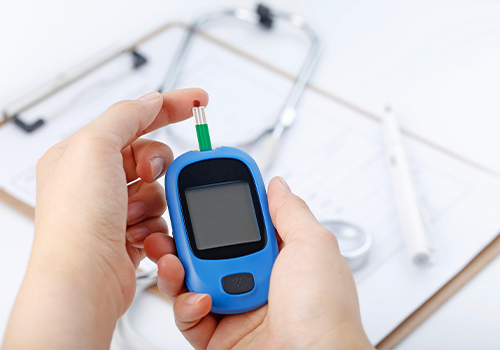Blood Glucose Level
Gain a deeper understanding of blood glucose levels and their significance, especially if you’re managing diabetes or aiming to prevent it. Our resources shed light on how blood glucose affects your energy levels, and we offer insightful information on keeping your levels stable through balanced nutrition and active living.
What is Blood Glucose ?
Blood glucose, a primary source of energy, fuels your body’s functions and activities. This intricate system involves glucose absorption from the foods you consume and its regulation by insulin, a hormone produced by the pancreas.
The Significance of Blood Glucose Levels:
Maintaining balanced blood glucose levels is critical. High blood glucose levels, stemming from insufficient insulin or insulin resistance, can lead to diabetic complications affecting the eyes, kidneys, and cardiovascular system. Conversely, low blood glucose levels can cause dizziness, confusion, and, in severe cases, unconsciousness.

Managing Diabetes and Prevention:
Effective diabetes management involves personalized strategies. There are two common types of diabetes:
Type 1
Diabetes is usually first diagnosed in children, teenagers, and young adults. It occurs as the pancreas no longer makes insulin because the beta cells (insulin-producing cells) have been attacked and destroyed by the immune system. Type 1 diabetes necessitates insulin administration, either through injections or insulin pumps.
Type 2
Diabetes is the most common form of diabetes and can be developed at any age. It begins with insulin resistance when muscle, liver, and fat cells do not respond to insulin properly. Initially, the secretion of insulin is still able to cope with the increasing demand. However, the pancreas loses its ability to secrete enough insulin in response to meals gradually. Type 2 diabetes management emphasizes lifestyle changes, including adopting a nutrient-rich diet, engaging in regular physical activity, and potential medication use. Preventive measures focus on maintaining a healthy weight, managing stress, and avoiding sedentary behavior.
Fasting Plasma Glucose Test
The Fasting Plasma Glucose (FPG) test is a commonly used diagnostic tool to assess your blood sugar levels after an overnight fast. This test provides valuable insights into your body’s ability to regulate glucose and can help identify prediabetes or diabetes.
The results of the FPG test are typically expressed in milligrams of glucose per deciliter of blood (mg/dL). Here’s how to interpret the results:
- Normal: FPG level below 100 mg/dL
- Prediabetes: FPG level between 100 mg/dL and 125 mg/dL
- Diabetes: FPG level of 126 mg/dL or higher on more than one occasion
Effects on Energy Levels and Mood:
Blood glucose levels play a pivotal role in energy and mood regulation. Swift changes in blood glucose can trigger mood swings, irritability, and mental fatigue. By stabilizing blood glucose levels, you can experience sustained energy, improved focus, and enhanced emotional well-being.
Mindful Nutrition and Glycemic Index:
Embrace a balanced diet that considers the glycemic index (GI) of foods. Low-GI foods release glucose gradually, promoting stable blood sugar levels. Incorporate whole grains, legumes, non-starchy vegetables, and lean proteins. Minimize high-GI foods like sugary snacks and refined carbohydrates to prevent rapid blood sugar spikes.
Hydration and Blood Glucose:
Staying hydrated is essential for blood glucose management. Dehydration can lead to higher blood glucose concentrations. Adequate hydration supports kidney function and assists in glucose elimination.
By delving into the intricacies of blood glucose and embracing informed choices, you empower yourself to optimize your well-being, energy levels, and overall quality of life.
References:
